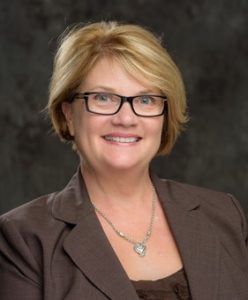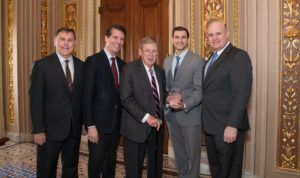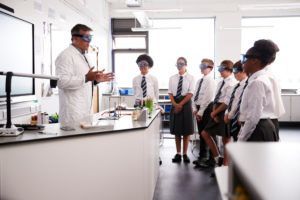Looking back on a year of growth and ahead to a year of opportunity: our Q&A with Georgia Bio Chair Patty Fritz
Patty Fritz, UCB Vice President, U.S. Corporate Affairs, presided as chair of Georgia Bio during its 30th anniversary year. Looking back on advancements in Georgia’s life sciences industry in 2019 and ahead to what 2020 may hold, she recently shared her thoughts with us. We are pleased to share them with you in the following Q&A.
Q: How would you characterize 2019 for the Georgia life science industry?
A: This has been an exciting year of growth for the Georgia life sciences industry. In Georgia Bio’s 30th anniversary year, the organization’s transformation is reflective of the life sciences in Georgia as a whole. I think about all of the rich pieces of the puzzle we enjoy here. Georgia is home to leading academic research institutions, startups, the Centers for Disease Control and Prevention, entrepreneurs along with robust biotech, medical device, pharma, digital, and global health industries.
Global health has risen to a top growth opportunity for the state. This year made clear to us that policy makers and state officials recognize the importance of the life science industry’s contribution to improving lives, economic growth, and opportunities for the future.
Q: What were the most encouraging ecosystem developments this year?
A: Our state of the industry report released in April shows the life science industry contributes to 3.7% of total employment in the state and $21.8 billion to the state’s gross domestic product. We are very encouraged by, and thankful for recognition of the industry’s value and importance by the governor, lieutenant governor, and policymakers. The appropriation of state funding for Georgia Bio’s Rural Teacher Training Initiative is one very specific example of this recognition. It serves the interest of furthering our ability to support STEM education and cultivate Georgia’s future workforce in the life sciences.
Q: What do you think 2020 will bring to the ecosystem?
A: I think we will see the industry continue its growth trajectory in 2020. The support of our policymakers and communities to attract and incentivize investment in the life sciences will help more startups grow. It will also encourage future investment in expansion by more established organizations like UCB, Takeda, and Boehringer-Ingelheim and others with existing presence in the state. All of the work at UCB that is done right here in Georgia is aimed at developing medical advancements and interventions for people with severe diseases.
Q: What would you encourage your colleagues – or incoming board chair for example – to make priorities in 2020?

A: Continue to support workforce preparedness through STEM education programming and our research ecosystem. We all need to continue to grow our collective engagement with policymakers. We need to ensure incentives are available to grow and contribute more to the state’s economy. Strengthen your connections between life science ecosystem stakeholders. This supports our need to amplify our impact and opportunity to cultivate and grow a sustainable ecosystem of innovation..
Q: What have you learned during your time as Georgia Bio Chair?
A: Serving as Georgia Bio Chair has helped me recognize how valuable the resources and impact of the community are right here at home. I thought I knew prior to becoming chair, but this experience has given me a better understanding of just what we have here in our own backyard. The leadership of Georgia Bio and other life science organizations here, like the Georgia Global Health Alliance, is very strong.
In my experience, I have found consistently that the goals amongst the life sciences industry leaders are incredibly high. And given the ingredients to support those leaders and those organizations, those goals are achievable.
I would also have to say that the Georgia life sciences has a unique strength that extends beyond the borders of Georgia and even the United States, and that is our ability to lead in the global health ecosystem. I reflect on the presence of the Center for Disease Control and the Georgia Global Health Alliance, just to mention a couple.
We also benefit from a thriving health technology and specifically digital health industry that is growing and having an even greater role in healthcare and in medical innovation.
Overall, we have enormous capability to come together with a shared vision and roadmap for advancing the life sciences and its positive patient impacts in Georgia and beyond. To get there requires us to come together, be intentional and clear about what we want to do, how we’re going to do it, and hold ourselves accountable to deliver.
Q: Who would you like to thank?
A: I want to thank Maria Thacker-Goethe for her leadership. She took on her new role during a year of transition and has done tremendous work. She is a thread between many organizations in the ecosystem and community, balancing their needs along with Georgia Bio’s in order to continue to move us ahead. I thank the Georgia Bio Executive Committee which has been instrumental in supporting her and serving as an important part of the fabric that binds the ecosystem together. I want to thank my own company, UCB, not just for its commitment to our own mission, its impact and value, but for being vibrant contributor to Georgia’s health economy. And I especially thank my family for allowing me to dedicate so much time and work to UCB and the state.
Q: Is there anything else you’d like to share?
We have a leading role to play as an accelerant to amplify the impact of innovative digital health and health tech companies in Georgia like Sharecare, Patientory, and others. They do not live alongside the life sciences industry as traditionally defined, they are interwoven within it. The life sciences industry is more than ever an integrated set of capabilities. Data collected from patients is essential in delivering real world insight into patient experiences, gaps and needs. Aggregating large data sets to which we would not normally have access enable us to learn more about what’s working and what’s not more quickly to inform our research. That research brings better interventions for patients in the future. It’s all connected. We use AI to understand patient populations most likely to be responsive to certain treatments, address unmet needs and bring new therapies to patients.
Thank you, Patty for your service as Georgia Bio Chair and for your insights!





